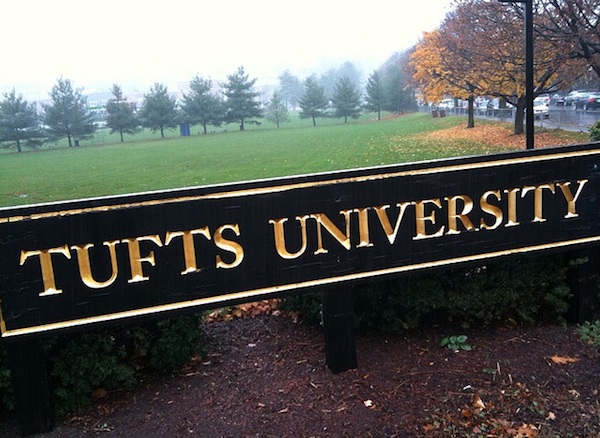Excessive Drinking Isn’t Just a Tufts University Problem

Photo Credit: Pete Jelliffe via Flickr
If you’ve been a college student in the last decade or so, there’s a chance that news of Tufts students’ public urinations and drunken hospitalizations at their annual “Winter Bash” will strike you as at least vaguely familiar. Tufts Dean of Student Affairs Bruce Reitman announced Tuesday in a Tufts Daily op-ed that the administration would reconsider the Winter Bash in coming years after 15 to 20 students spent the evening of February 1 in the hospital “where the paramedics were trying to make sure you didn’t die due to your level of intoxication.” He continued by listing the kinds of students he says ruined the event, held at the Westin Copley:
I am referring also to the friends of those fifteen who facilitated their drinking. I am referring also to the several students who interfered with event staff trying to help some of the drunks who couldn’t quite walk on their own. I am referring also to the rude, arrogant individuals who apologized for disdainful behavior towards several Tufts staff by saying, “Sorry, I thought you worked for the hotel.” I am referring also to the myriad students who threw up all over the place and everyone who thought it was okay for the hotel staff to clean up the mess. And I’m referring to the male student and the female student who decided that urinating in the middle of the lobby was okay. Really?
Obviously, a tale of students from a selective private university peeing in an elegant hotel lobby is salacious enough that the Dean’s column has gone somewhat viral. In some of the commentary we’re seeing, there’s an idea that this is a problem somehow specific to Tufts. Here’s just one Twitter user’s reaction:
@bostondotcom I thought tufts had a high admissions bar, guess not.
— jessidig (@jessidig) February 20, 2013
Let’s not let Tufts off the hook completely, but note that this seems like a story that could happen at any number of schools with high bars for admissions. Come to think of it—it has happened at other schools. Just last October, administrators at Yale University decided to cancel the hugely popular 1980s-themed “Safety Dance” after students ended up at the hospital several years in a row. The final straw came in 2012 when eight students took a trip to the E.R. An administrator announced it would be cancelled in an e-mail to students, saying that not only were the rising numbers of hospitalizations a problem, so was the behavior of many other students. “There were countless incidents inside the dance, most of them unrepeatable, that can be directly attributed to drunkenness,” an administrator wrote. (Yale had the P.R. smarts not to publicize the exact nature of the incidents. No such luck at Tufts.)
As it turns out, all across the land, our multi-tasking college students have often managed both to clear high hurdles for admission and to drink themselves into the backs of ambulances. One problem here is the way formal college events encourage underage drinkers to consume their alcohol at a pre-game in a large enough quantity to last them through a dance at which they aren’t old enough to purchase more. The Tufts dance did have a “21+ pub area” but most college students don’t have access, which means many of them front-load their consumption in a way that often hits them all at once, leaving them in a hospital bed. (Of course, it’s hard to imagine the amount of liquor needed to make peeing on the Westin Copley lobby seem like a reasonable move. But the students’ disrespect for the basic rules of human decency once they became intoxicated is another matter…)
In 2008, then-Tufts President Lawrence Bacow signed on with an organization of college presidents known Amethyst Initiative that seeks more debate on lowering the drinking age. Many of the presidents who’ve signed on say that the over-21 laws make for a culture of secrecy on their campuses that means students can’t learn to drink responsibly among adults at public functions. Bacow told the Tufts Daily when he joined that enforcing the drinking age at Tufts hadn’t worked effectively, and may have actually resulted in “driving drinking underground, and in the process, may have put more students at risk.” In the wake of 15 hospitalizations and a public relations nightmare, his warning seems pretty relevant this week. And while other schools in the area might be enjoying their break from unflattering news coverage, they should be watching carefully, because this isn’t just a problem for Tufts. It’s a problem for any school navigating the mini-Prohibition that is modern American college life.

